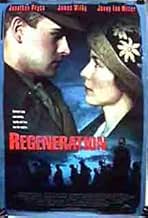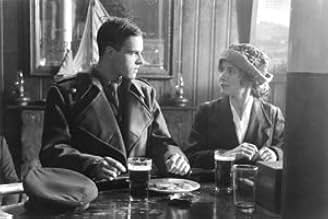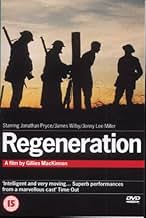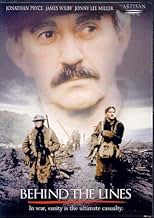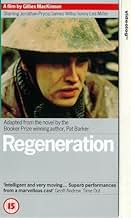Füge eine Handlung in deiner Sprache hinzuBased on Pat Barker's novel of the same name, "Regeneration" tells the story of soldiers of World War One sent to an asylum for emotional troubles. Two of those soldiers are England's most i... Alles lesenBased on Pat Barker's novel of the same name, "Regeneration" tells the story of soldiers of World War One sent to an asylum for emotional troubles. Two of those soldiers are England's most important WW1 poets.Based on Pat Barker's novel of the same name, "Regeneration" tells the story of soldiers of World War One sent to an asylum for emotional troubles. Two of those soldiers are England's most important WW1 poets.
- Regie
- Drehbuch
- Hauptbesetzung
- Nominiert für 1 BAFTA Award
- 17 Nominierungen insgesamt
Empfohlene Bewertungen
The opening scenes are done quite like a painting. They are very impressive, and the overhead shots are simply majestic. The story, however, is set in a mental institution, where Doctor Rivers (played with brilliance by Jonathan Pryce) is set on 'curing' the shell-shocked patients. There are three that the movie focuses on in particular: Siegfried Sassoon, Wilfred Owen, and Billy Prior, respectively played by James Wilby, Stuart Bunce, and Johnny Lee Miller.
Previous comments have compared this film to Saving Private Ryan, yet there are several marked differences between the two. Ignoring the fact that they are set in two different wars, Saving Private Ryan examines the idea of heroism on the field, while Regeneration takes look on how war effects men psychologically.
Certainly a worthy look, and a fine addition to any film collection.
James Wilby gives a remarkable performance as an officer who is sickened by the war that he sees around him. He isn't so much mentally ill as disgusted with war and his contribution in it. Jonny Lee Miller is also amazing in his portrayal of an officer driven mute. When he discovers his voice he is angry and argumentative, but slowly we discover that all of his anger is a shell to protect the hurt that has built up inside of him.
One of the biggest underlying themes in this film is how useless war is, even if it is for the right cause. Mainly because it destroys the human psyche and removes hope.
This is a startling film, and touching and emotional. It cuts to the core of who we all are, as human beings.
The drama is based on real events, and the performances are quite stunning. Above all, Jonathan Pryce as Dr. Rivers is simply incredible, a man torn between duty and compassion, a doctor on the verge of becoming a patient himself. In a just world, he would have won an Oscar (but hardly anyone, it seems, saw this film on initial release). The handsome James Wilby gives a very fine performance as Sassoon--in fact, I've never seen him in better form. Johnny Lee Miller perfectly embodies the edgy anger, angst, and shame of Billy Prior. And Stuart Bunce brings a remarkably gentle, otherworldly quality to his haunting portrayal of Wilfred Owen. You absolutely believe that this man has a poet's soul; but he finds his voice not by contemplating beauty but by contemplating supreme horror.
There are many scenes from this film I will never forget--particularly, Dr. Rivers' trip to see another doctor cure a patient of being mute by applying electricity directly to his teeth and larynx. This scene is horrifying and, yet, like the rest of the film, restrained, in part because of the way Pryce portrays Rivers' reactions. Another unforgettable scene is the abrupt, shattering ending--but I won't give that away. Suffice it to say that words, especially the words of a great poet, sometimes are more powerful than shocking images.
This is a very intelligent, moving, humane, and important film. What a shame that it has been so overlooked.
The opening aerial shot of the bloody consequences of battle are every bit the emotional and visceral equal of Spielberg's lauded 20-minute opening sequence in Saving Private Ryan. The rest of the film - in my opinion - surpasses Ryan as a whole in terms of its drama, poetry, anguish and thought.
The performances are outstanding. Jonathan Pryce's portrayal of Rivers falling apart at the seams as he adopts the neuroses and trauma of his patients is astonishing. Johnny Lee Miller is also excellent as the (initially) mute soldier, haunted by the brutality of a trench-attack. James Wilby's Siegfried Sassoon is perhaps the toughest role to play in the film and yet he surpasses any prior (or subsequent) performances with a characterisation that swings from harsh to likeable, strong to weak, right to wrong.
All of the numerous storylines are well constructed and followed to their natural conclusion. There are no false avenues; no bum notes; no waste.
The source material is beautifully adapted for the film (by the rare breed of writer-producer, Allan Scott), losing none of its pace or characterisation. The emotional weight so prominent in Barker's novel are perfectly transferred into the movie. How wonderful for a modern film to have non-stereotypical, imperfect lead characters and lack easy conclusions. How beautifully evoked is the friendship between Sassoon and Owen. There is no sacharine sentiment in this movie; nor artificial shock to induce pity; nor a wasted scene or moment of dialogue. Equally, the period look of the film is stunning. Filmed in Scotland, the vistas are beautifully bleak and wintry. The atmosphere of the First World War is all too frighteningly real.
The music, whilst beautiful, is perfectly restrained. Harking back to the films of the seventies, long moments of silence pervade Regeneration. How did things go so badly wrong in the last twenty years in this respect?
Regeneration achieves the very rare distinction of matching (if not surpassing) the beautiful and moving novel on which it is based. Thoughtful film-goers should treat themselves to this wonderful and intelligent film.
Wusstest du schon
- WissenswertesThe film used a lot of present and former Territorial Army soldiers as extras for larger scenes. This includes soldiers from 52nd Lowland, 6th Battalion Royal Regiment of Scotland, located in Hotspur street, Glasgow.
- PatzerThe camera and the crane on which it is suspended are reflected in several puddles during the very opening shot (of the battlefield).
- Zitate
Capt. William Rivers: I find it interesting that you don't stutter.
Billy Prior: I find it even more interesting that you do.
- Alternative VersionenReleased in the USA in a 96 minute version under the title "Behind the Lines".
- VerbindungenFeatured in The 100 Greatest War Films (2005)
- SoundtracksJust Before The Battle, Mother
Words and Music by George Frederick Root (As G.F. Root)
Performed by Craig Titus
Top-Auswahl
- How long is Regeneration?Powered by Alexa
Details
- Erscheinungsdatum
- Herkunftsländer
- Sprache
- Auch bekannt als
- Krigets dårar
- Drehorte
- Overtoun House, Dumbarton, West Dunbartonshire, Schottland, Vereinigtes Königreich(Craiglockhart Hospital)
- Produktionsfirmen
- Weitere beteiligte Unternehmen bei IMDbPro anzeigen
Box Office
- Bruttoertrag in den USA und Kanada
- 33.131 $
- Eröffnungswochenende in den USA und in Kanada
- 19.593 $
- 16. Aug. 1998
- Weltweiter Bruttoertrag
- 33.131 $
Zu dieser Seite beitragen



